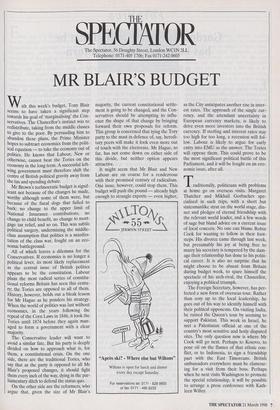The Spectator, 56 Doughty Street, London WC1N 2LL Telephone: 0171-405
1706; Fax 0171-242 0603
MR BLAIR'S BUDGET
With this week's budget, Tony Blair seems to have taken a significant step towards his goal of 'marginalising' the Con- servatives. The Chancellor's instinct was to redistribute, taking from the middle classes to give to the poor. By persuading him to abandon these plans, the Prime Minister hopes to subtract economics from the polit- ical equation — to take the economy out of politics. He knows that Labour, New or otherwise, cannot beat the Tories on the economy in the long term. A successful left- wing government must therefore shift the centre of British political gravity away from the tax and spending debate. Mr Brown's technocratic budget is signif- icant not because of the changes he made, worthy although some of them were, but because of the fiscal dogs that failed to bark: no change to the upper limit of National Insurance contributions, no change to child benefit, no change to mort- gage tax relief, and so on. This was subtle political surgery, undermining the middle- class assumption that politics is a manifes- tation of the class war, fought on an eco- nomic battleground. All of which leaves a dilemma for the Conservatives. If economics is no longer a political lever, its most likely replacement as the central issue of British politics appears to be the constitution. Labour plans the most radical series of constitu- tional reforms Britain has seen this centu- ry; the Tories are opposed to all of them. History, however, holds out a bleak lesson for Mr Hague as he ponders his strategy. When the world of politics was last without economics, in the years following the repeal of the Corn Laws in 1846, it took the Tories until 1874 before they again man- aged to form a government with a clear majority.
The Conservative leader will want to avoid a similar fate. But his party is deeply divided on how to approach what is, for them, a constitutional crisis. On the one side, there are the traditional Tories, who say that as the party is opposed to all Mr Blair's proposed changes, it should fight them every inch of the way, dying in the par- liamentary ditch to defend the status quo.
On the other side are the reformers, who argue that, given the size of Mr Blair's majority, the current constitutional settle- ment is going to be changed, and the Con- servatives should be attempting to influ- ence the shape of that change by bringing forward their own proposals for reform. This group is concerned that tying the Tory party to the mast in defence of, say, heredi- tary peers will make it look even more out of touch with the electorate. Mr Hague, so far, has not come down on either side of this divide, but neither option appears attractive.
It might seem that Mr Blair and New Labour are on course for a rendezvous with their promised century of radicalism. One issue, however, could stop them. This budget will push the pound — already high enough to strangle exports — even higher, as the City anticipates another rise in inter- est rates. The approach of the single cur- rency, and the attendant uncertainty in European currency markets, is likely to drive even more investors into the British currency. If sterling and interest rates stay too high for too long, a recession will fol- low. Labour is likely to argue for early entry into EMU as the answer. The Tories will oppose them. This could prove to be the most significant political battle of this Parliament, and it will be fought on an eco- nomic issue, after all.
Traditionally, politicians with problems at home go on overseas visits. Margaret Thatcher and Mikhail Gorbachev spe- cialised in such trips, with a short but statesmanlike strut on the world stage, din- ner and pledges of eternal friendship with the relevant world leader, and a few words of sage but bland advice on a current issue of local concern. No one can blame Robin Cook for wanting to follow in their foot- steps. His divorce came through last week, but presumably his joy at being free to marry his secretary is tempered by the dam- age their relationship has done to his politi- cal career. It is also no surprise that he might choose to be absent from Britain during budget week, to spare himself the spectacle of his arch-rival, the Chancellor, enjoying a political triumph.
The Foreign Secretary, however, has per- fected a new form of overseas tour. Rather than cosy up to the local leadership, he goes out of his way to identify himself with their political opponents. On visiting India, he ruined the Queen's tour by seeming to support Pakistan. This week in Israel, he met a Palestinian official at one of the country's most sensitive and hotly disputed sites. The only question now is where Mr Cook will go next. Perhaps to Kosovo, to pour oil on the flames of that ethnic con- flict, or to Indonesia, to sign a friendship pact with the East Timoreans. British ambassadors everywhere must be clamour- ing for a visit from their boss. Perhaps when he next visits Washington to promote the special relationship, it will be possible to arrange a press conference with Kath- leen Willey.




































































 Previous page
Previous page